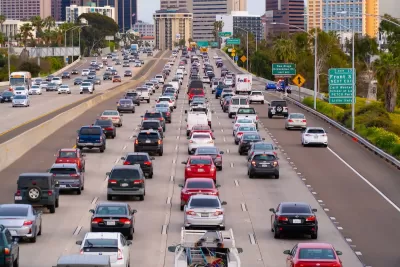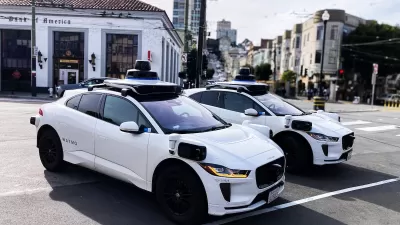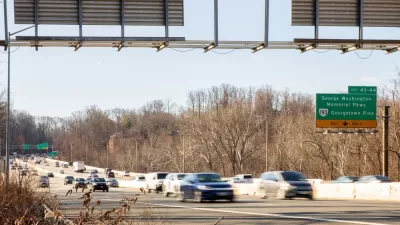The argument that car-centric development is good because it boosts national GDP ignores the massive costs of driving to everyday Americans.

In an opinion piece in Streetsblog USA, Andy Boenau argues that the link between more driving and higher GDP isn’t necessarily a good thing.
According to Boenau, the argument that GDP rises with VMT is “used in lazy attempts to prove road expansions for motor vehicles are necessarily good while traffic calming, road diets, bike lanes, transit lanes, etc. are bad. I do think the VMT/GDP overlay is an interesting talking point, but not in the way it’s generally spun by my fellow keyboard warriors.”
Boenau acknowledges that cars have greatly expanded our reach and opened up access to jobs and economic opportunities. In fact, if you take a simplistic perspective, sprawl is ‘good’ for GDP because it drives spending on roads, cars, fuel, and other related expenses. “VMT rises out of necessity, not as a marker of genuine growth or wealth.”
However, “GDP doesn't tell the dirty details of the car-dependent lifestyle most of America is burdened with.”
You might look at our soaring VMT trend as a reflection of disastrous land use and housing regulations rather than a direct sign of progress.
Boenau points to the high cost of car crashes for the U.S. healthcare system. According to the National Highway Traffic Safety Administration (NHTSA), motor vehicle crashes cost Americans roughly $340 billion in 2019 — costs that count as part of our GDP but are by no measure a positive thing for Americans. Beyond VMT and GDP, Boenau urges the reader to “Look at sedentary lifestyles, physical activity, heart disease, obesity, chronic illness, depression, anxiety. Look at the costs of each family having to be a fleet operator.”
FULL STORY: Opinion: Yes, the GDP Rises When We Drive More. But That Isn’t A Good Thing.

Montreal Mall to Become 6,000 Housing Units
Place Versailles will be transformed into a mixed-use complex over the next 25 years.

Planetizen Federal Action Tracker
A weekly monitor of how Trump’s orders and actions are impacting planners and planning in America.

DARTSpace Platform Streamlines Dallas TOD Application Process
The Dallas transit agency hopes a shorter permitting timeline will boost transit-oriented development around rail stations.

Without International Immigrants, the Rural US Population Would Be Falling 58%
Census data shows that population growth in rural areas is due in large part to international migrants.

Dead End: Nine Highways Ready for Retirement
The Freeways Without Futures report describes the nation’s most promising highway removal proposals.

Congressman Proposes Bill to Rename DC Metro “Trump Train”
The Make Autorail Great Again Act would withhold federal funding to the system until the Washington Metropolitan Area Transit Authority (WMATA), rebrands as the Washington Metropolitan Authority for Greater Access (WMAGA).
Urban Design for Planners 1: Software Tools
This six-course series explores essential urban design concepts using open source software and equips planners with the tools they need to participate fully in the urban design process.
Planning for Universal Design
Learn the tools for implementing Universal Design in planning regulations.
City of Mt Shasta
City of Camden Redevelopment Agency
City of Astoria
Transportation Research & Education Center (TREC) at Portland State University
City of Camden Redevelopment Agency
Municipality of Princeton (NJ)
Regional Transportation Commission of Southern Nevada





























